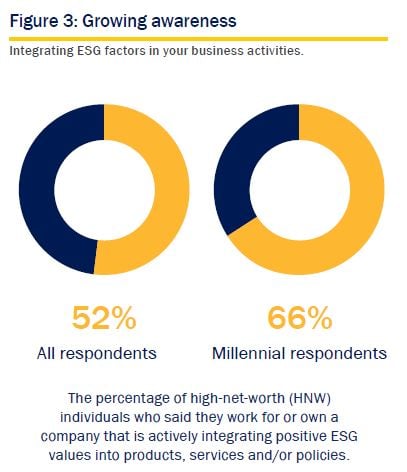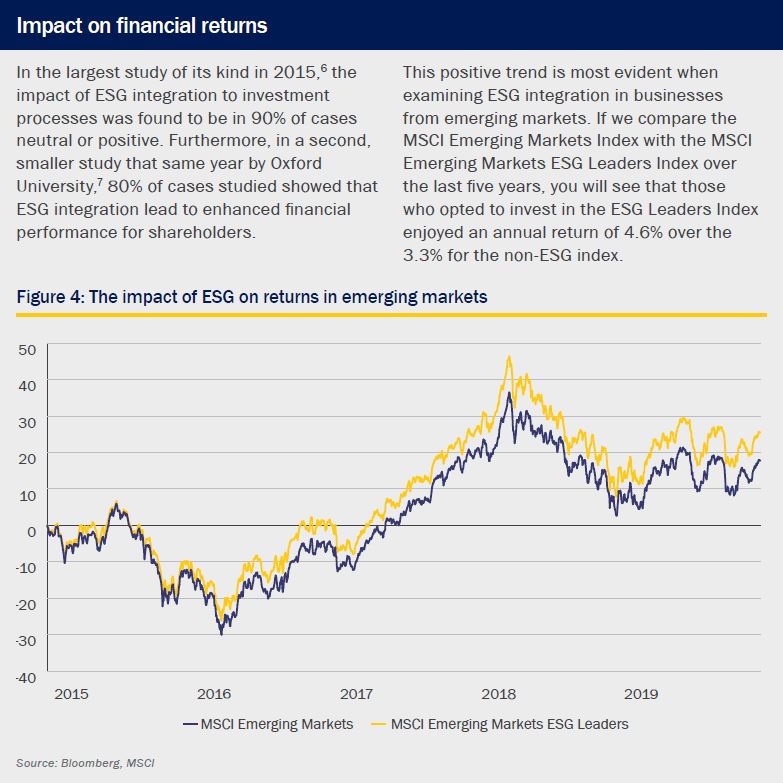Wealth Management: Investment Views – ESG in managing wealth

Investment adviser Amaya Gutiérrez explores changing attitudes by private clients towards responsible investing
How relevant is responsible investing in the minds of wealth management clients today and why?
Recent market studies have shown that more than 80% of the general population show an interest in responsible investing. More importantly, that figure climbs to 95% in the case of millennnials, the younger generation born after the 1980s. This age cohort is particularly concerned about doing good, not just well: almost 90% of them expect investment advisers to look into a company's commitment to its values before proceeding to invest. In fact, more than half of millennials have discussed responsible investing with their financial adviser compared to only 11% of baby boomers.3
Growing awareness of the environmental movement and greater exposure to ESG considerations in the workplace are important reasons why younger generations are turning to responsible investing today.
As a client, there are various ways in which you can approach the topic of responsible investing. Can you tell us what approaches people use?
The earliest and still most common approach applied in portfolios is to use 'Exclusion' ESG criteria. This is where, with the client, we agree on a pre-defined list of sectors, activities or products which we will exclude from their portfolios. Such exclusions may include, for example, “no alcohol producers” or “no companies with more than 5% of revenues selling firearms".
Another popular ESG approach is to invest in 'Best-in-class' businesses. In this case, we screen sectors to find the companies that have the best ESG ratings amongst their peers. This positive selection process tends to be done with the assistance of an ESG research house that scores companies depending on their environmental, social and corporate governance practices.
Beyond Exclusion and Best-in-class approaches, clients can gain a holistic exposure to ESG matters in their portfolio, through a full 'ESG Integration' approach. This seeks to consider both the negative and positive ESG aspects of a business and involves the systematic inclusion of environmental, social and governance factors into our financial analysis. ESG integration tends to be accompanied by Active Ownership, where investors engage with companies so that they improve their best practices.
Finally, there is impact investing, an example of which is the R-co 4Change Impact Finance Fund. Given the need for specialist services in sourcing and reporting on impact investing, we tend to partner with a specialised platform for those wealth management clients wishing to invest in impact investing such as microfinancing.
Six approaches to responsible investing |
|
| 1. Exclusionary screening | Exclusion from a fund or portfolio of a sector, activity, product or service (such as firearms, weapons, tobacco and coal) in accordance with clients' wishes. |
| 2. Best-in-class screening | Selection of securities based on their positive ESG performance relative to their industry peers. |
| 3. ESG integration | The explicit integration by investment managers of environmental, social and governance factors into financial analysis and security selection. |
| 4. Thematic investing | Within responsible investing, thematic strategies can be used to address long-term ESG challenges, with the aim of generating financial return. |
| 5. Impact investing | Targeted investments aimed at solving specific environmental or social issues. Unlike thematic investing, investors measure equally social impact and financial returns. |
| 6. Corporate engagement | The use of shareholder ownership to influence corporate behaviour and its application of ESG principals, either through direct engagement with companies' management boards or through proxy voting. |
An important question for clients then - what, if any, impact does ESG investing have on expected financial returns?
The overwhelming majority of studies in this field suggest that the impact of ESG factors on financial returns is at worst neutral and at times positive.
When looking at the data,4 it should come as no surprise that companies with strong ESG credentials tend to have more sustainable business models. With better risk management and corporate governance, they also tend to have fewer negative, loss-making events associated with them, such as fraud, litigation or environmental damage. In turn, these businesses have better access to capital and investors are willing to pay a premium for that. This is particularly the case in emerging markets where corporate governance standards vary more widely than in the developed world.
In developed markets, such as Canada and Europe, where responsible investing represents almost 50% of total professionally managed assets,5 companies which fail to display adequate ESG credentials will find that fewer investors are willing to invest in them, impacting their share price. Moreover, companies with pooor ESG ratings can be excluded from responsible investment indices, which in turn can also negatively impact on the company's share price.
Click here to continue: Investment Views - Shareholder engagement and activism
In this Investment Views:
- Combining business with humanity: Foreword
- Responsible investments
- ESG in managing wealth (current page)
- Shareholder engagement and activism
- Important information
Download the full Combining business with humanity in PDF format (2.57 MB)
3 US Trust, Insights on Wealth and Worth, 2018; 2016; 2014. Survey of nearly 1,000 high net worth (HNW) and ultra high net worth (UHNW).
4 Giese, Lee, Melas, Nagy, Nishikawa. Foundations of ESG Investing: How ESG affects equity valuation, risk and performance, The Journal of Portfolio Management, July 2019.
5 Global Sustainable Investment Alliance 2018.
6 This involved the examination of over 2,200 separate cases: University of Hamburg, Gunnar Friede, Timo Busch & Alexander Bassen (2015) ESG and financial performance: aggregated evidence from more than 2,000 empirical studies, Journal of Sustainable Finance & Investment, 5:4, 210-233, DOI: 10.1080/20430795.2015.1118917.
7 Oxford, Arabesque 2015: Clark, Gordon L., Andreas Feiner, and Michael Viehs, From the Stockholder to the Stakeholder: How Sustainability Can Drive Financial Outperformance. University of Oxford and Arabesque Partners. March 2015.

